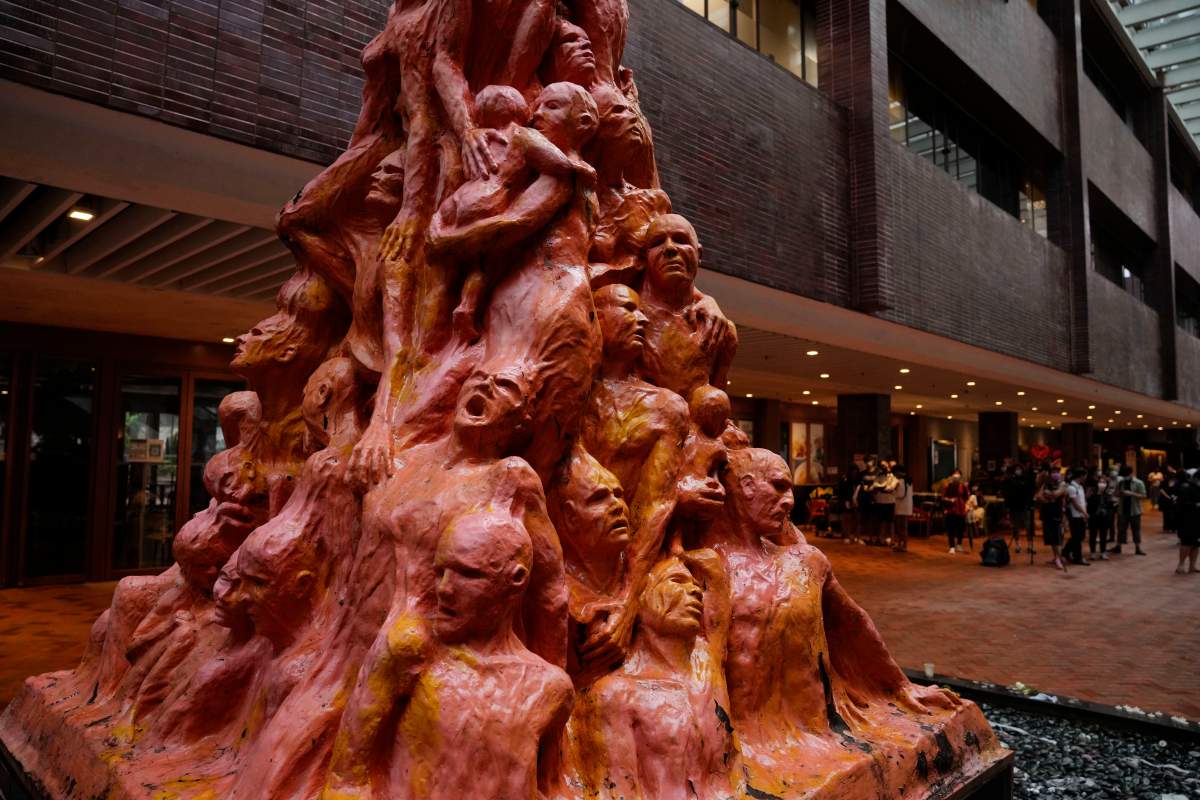A leading Hong Kong university has dismantled and removed a statue from its campus site that for more than two decades has commemorated pro-democracy protesters killed during China’s Tiananmen Square crackdown in 1989, Reuters witnesses said.

The artwork, of anguished human torsoes, is one of the few remaining public memorials in the former British colony to remember the bloody crackdown that is a taboo topic in mainland China, where it cannot be publicly commemorated.
The Council of the University of Hong Kong (HKU) said in an early Thursday statement it made the decision to remove the statue at a meeting on Wednesday, “based on external legal advice and risk assessment for the best interest of the University.”
“The HKU Council has requested that the statue be put in storage, and that the University should continue to seek legal advice on any appropriate follow-up action,” it said.
Late on Wednesday night, security guards placed yellow barricades around the eight-meter (26-foot) high, two-tonne copper sculpture called the “Pillar of Shame” that commemorates those killed by Chinese authorities more than three decades ago.
Two Reuters journalists saw scores of workmen in yellow hard hats enter the statue site, which had been draped on all sides by white plastic sheeting and was being guarded by dozens of security personnel.

Get breaking National news
Loud noises from power tools and chains emanated from the closed off area for several hours before workmen were seen carrying out the top half of the statue and winching it up on a crane towards a waiting shipping container.
A truck later drove the container away early on Thursday. The site of the statue was covered in white plastic sheets and surrounded by yellow barricades.
Several months ago, the university had sent a legal letter to the custodians of the statue asking for its removal.
Danish sculptor Jens Galschiot, who created the statue, said in a statement he was “totally shocked” at this move against his private property and that he would “claim compensation for any damage to the sculpture.”

HKU said in its statement that no party had ever obtained approval to display the statue on its campus and that it had the right to take “appropriate actions” any time. It also called the statue “fragile” and said it posed “potential safety issues.”
Some students said the move would undermine HKU’s reputation.
“The university is a coward to do this action at midnight,” said a 19-year-old student on the scene surnamed Chan. “I feel very disappointed as it’s a symbol of history. This university claims it advocates academic freedom yet it can’t even keep a historical monument.”
Another student surnamed Leung said he was “heart-broken” to see the statue “being cut into pieces.”
The removal of the statue is the latest step targeting people or organizations affiliated with the sensitive June 4, 1989, date and events to mark it.
Authorities have been clamping down in Hong Kong under a China-imposed national security law that human rights activists say is being used to suppress civil society, jail democracy campaigners and curb basic freedoms.
Authorities say the law has restored order and stability to the city after massive street protests in 2019. They insist freedom of speech and other rights remain intact and that prosecutions are not political.
China has never provided a full account of the 1989 crackdown. Officials gave a death toll of about 300, but rights groups and witnesses say thousands may have been killed.
“What the Communist Party wants is for all of us to just forget about this (Tiananmen). It’s very unfortunate,” John Burns, a political scientist at the university for over 40 years who had called for the statue to remain, told Reuters.
“They would like it globally to be forgotten.”








Comments